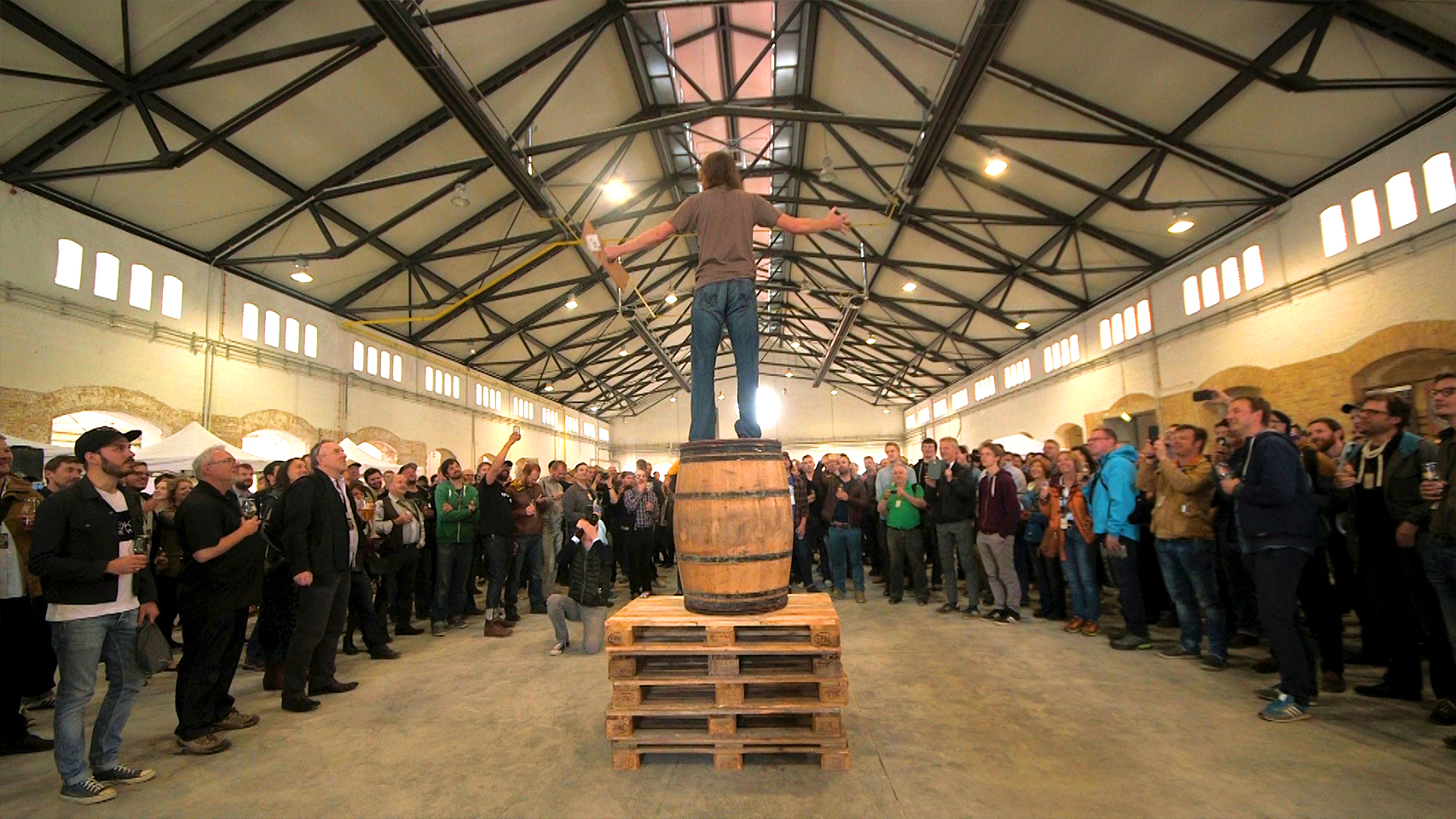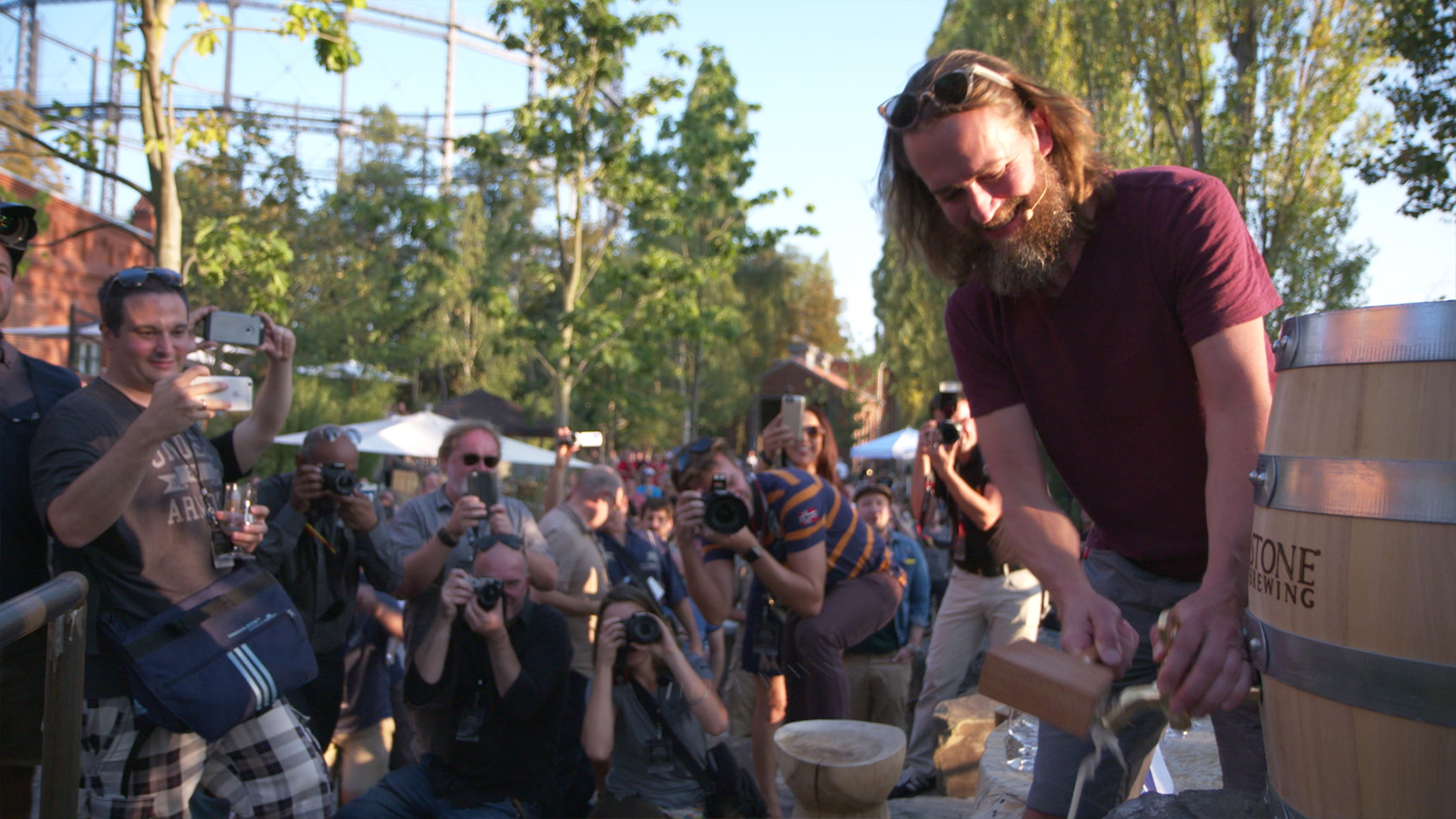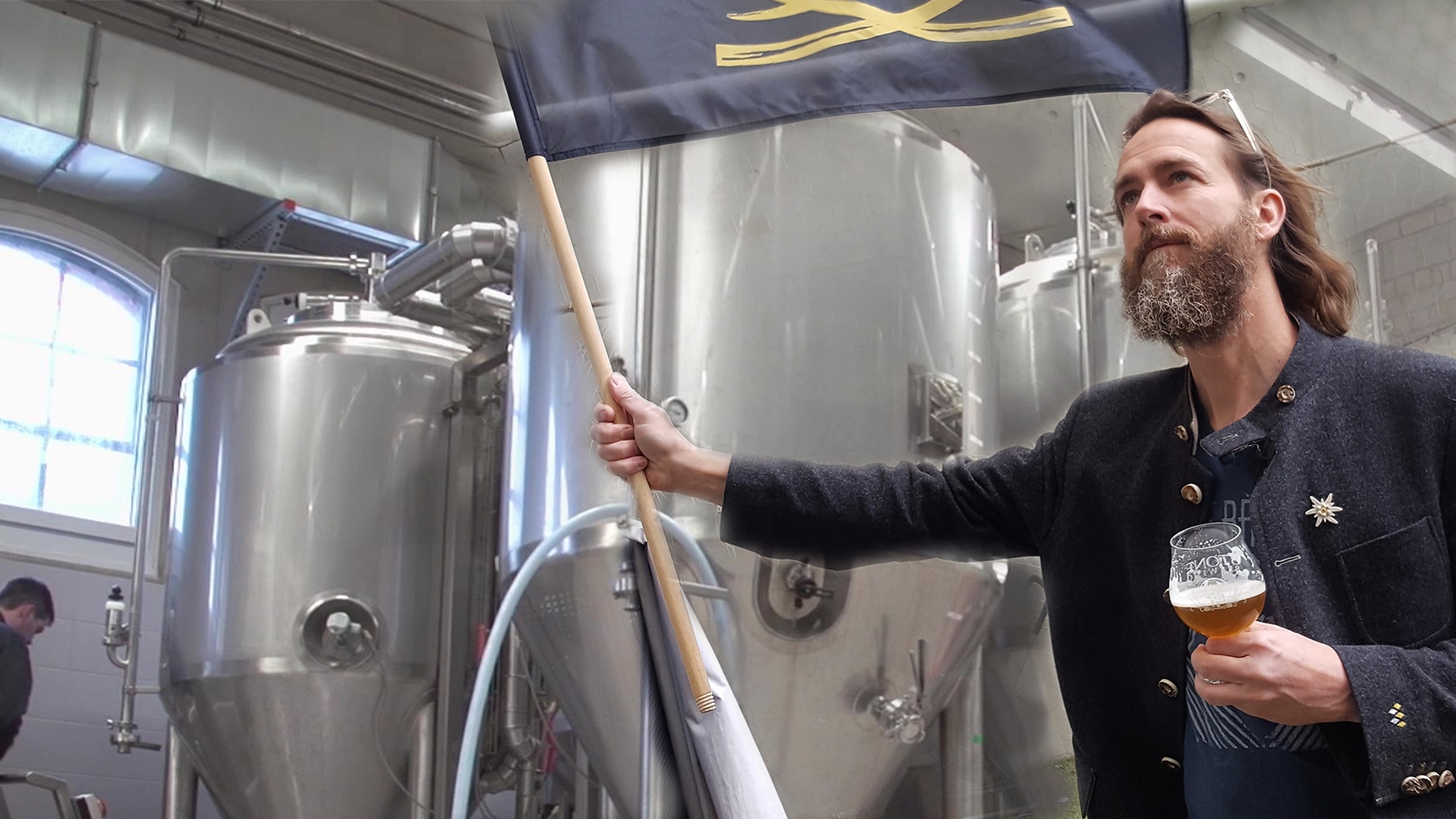Turning dreams into reality is an arduous road, full of pitfalls. No one knows this better than Greg Koch — who helped usher in the craft beer movement as we know it in the United States. Back in ’96, Koch and brewer Steve Wagner opened up Stone Brewing in San Marcos, California with the now-retired but still iconic Stone Pale Ale. It’d be easy to say “and the rest is history” given the explosive growth craft beer has seen across the U.S. and the rest of the world in the decades since, but it’s never that easy.
We caught up with Koch recently to talk about a documentary that was made about the push to open Stone Berlin back in 2016. The two-year endeavor to build one of the largest craft breweries in Europe — in a country with a staunch view of what beer should be — was meticulously documented in The Beer Jesus From America. (The film’s name was derived from local Berlin tabloid headline that mocked Koch’s long beard and hair.) The documentary covers everything from the ground-breaking of Stone Berlin to the actual opening of the massive brewery, beer garden, and restaurant in the southern reaches of the city.
Beer Jesus — which is available to stream on Amazon Prime — does a good job handling the trial and errors of an American trying to open a massive beer-related project in a very-regulated German city. The film also touches on a moment in time when the perception of craft beer changed dramatically across Europe and became a little more mainstream, in many ways thanks to the work Koch and his team put into the region. Unfortunately, the film ends when Stone Berlin opens, which isn’t the whole story. By 2019, Stone decided to sell their brewery to Scotland’s Brewdog and retreat back to the U.S. with the brewing of Stone’s beer being carried on through a partnership with Brewdog. (I remember being there when Stone Berlin had their last weekend. I was also there when Brewdog reopened the doors with all new branding, menu, and beers a few months later, a fascinating story all its own.)
My conversation with Koch gave me a chance to check in on how his world has changed since the struggle to launch Stone Berlin. We hit on everything from the documentary to beer trends to the realities of a world shaped by COVID-19.
Since we’re a year out from the sale and this film stops at a precarious point, how do you feel about watching the film now?
It’s really interesting watching it. It takes me on a rollercoaster every time. There’s a point in the film that I just want to turn it off out of frustration. Just like, “Okay, I’m done with this.” It’s like feeling this well of tightness around your neck and shoulders. And then the story arc breaks and the clouds began to part and the sun begins to shine a bit. But I find it interesting that it really takes me on that emotional journey every time, even though, not only do I know the story well, I lived the story.
I was around during the opening of Stone Berlin and it felt like a really positive time. But, man, re-watching the film, it feels like there’s almost a sense of PTSD. I kept thinking, “Wow, that was a hard couple of years.”
Yeah. There’s that frustration I was talking about, that tightness and just that feeling of, “I just can’t take this anymore.” And then the opening day was one of the best days of my entire life. It was just such a wonderful day in every respect. Not only what it symbolized, but just the day itself and the people that came out.
Looking at the film from a pure beer perspective, what did you see change over the course of your time in Berlin and Europe overall in the beer scene?
Well, I could feel a tremendous amount. It went from a very small scene in Berlin with a few notable players like Rainier Werth with his beer shop and then the guys at Vagabund. And that was now seven or eight years ago at this point. It was already starting to slowly transform when we arrived. And, I had already been a part of that transformation in Southern California and in the greater in the U.S. So, it was very exciting to be in Berlin and Europe in those founding stages again.

I was just rereading the interview you did with Joe Stange right after the sale. One of my favorite parts is when he asks you if you would change anything if you had had it to do over again, and you rebuffed him and said, “Are you kidding me?” I took that as, “Don’t look back, look forward.” Now with the gift of both space and time from the sale of Stone Berlin, what have you taken with you from the experience?
I think that the conditioning in Germany was stronger. In the US, we broke through the conditioning. People were conditioned to expect a beer to be that industrial, fizzy yellow stuff of the MillerCoors and Budweiser corps, and that was it. Maybe they were aware of the existence of a beer called Guinness. The beer could be dark, but they mostly didn’t think they’d like it. But now, the expectation in the United States is that there’s going to be variety. There’s going to be a range of styles and characters and ABVs and producers and all this. And it surprised me — for the beer country that Germany is — how disinterested the average population is with the conversation of beer.
Beer is not something that they talk about. It’s something they just do. It’s more a commodity. How much talking about your bottle of sparkling water do you engage in? How much talking about a package of deli meats from the store do you engage in? And that’s how beer is looked at too. Sure, it’s changing, but there’s — I don’t want to make too strong comments about the German culture because some of it’s born out of a bit of frustration — but, man, people just weren’t interested outside of what they’ve been sold already.
You still find that in the States too. People still reach for the cheap and easy.
Of course.
What I find interesting though is that you did survive through a partnership with BrewDog. You still have the Stone beer brewing here and a popular beer bar, so it’s not like it was a full retreat. You still have a foothold here in Europe. Hell, I still buy six-packs at my grocery store in Berlin.
Well, the truth of the matter is that we sold more beer in 2019 than we did in 2018, and we’ll sell more in 2020 than we did in 2019. So it continues to look up. And we are continuing to grow. But yeah, for me personally, the Berlin thing was a bit of a setback. But you’re right, as a company, let’s not forget that things continue to go well.
It feels like craft is always growing and yet on the edge. The margins are always razor thin and just the understanding of what beer can be is always a struggle. I can’t tell you how many people still tell me, flat out, they don’t like beer. And, I’m always asking, “well, which kind of beer are you even talking about?
I think that we were in business at least eight years before craft beer started to become popular in the United States. Before that, we endlessly heard things like, “What is it you do? Oh, you make that weird beer. It’s too fancy.” That kind of thing.
So we can look back at the sepia-toned, earlier days in the United States craft brewing movement, and think of how it was clear and all the signs were there for a craft beer boom. But the fact of the matter is, it was and still is pushing a boulder up a hill every day, and that’s just part of being an entrepreneur.

The passion of an artist as they say. I was actually at your Shanghai bar last year before everything.
The sad news that you may not have heard is that we have actually closed the Shanghai operation. The weird paradox of that is that it had been extremely successful. We had won all the awards: Best beer place in Asia, one of the top-rated Western restaurants in all of Shanghai, top 2 percent, all of that. But COVID-19 has just delivered such a sucker punch.
I imagine that had to be a tough decision.
It is really a combination of a lot of things. We were running on thin margins — even though very successful — based upon all this trade war nonsense. And then COVID-19 made it more than we could handle.
I’m sorry to hear about that.
Yeah. It’s crushing blow after crushing blow. That’s entrepreneurism. There you go, that’s back to the movie again.
Yeah, exactly. I know this is a cliche, but you’ve got to get up and keep going, right?
Absolutely.
The documentary feels resonant now, since it shows that you can get through hard times. So how are you dealing with this pandemic now that months have passed and it’s touched every part of the world?
I have a stoic philosophy and try to understand what things you can and cannot control. What you can control is how you react. Life constantly throws curveballs. COVID is especially unique in that it’s a giant curveball that we’re all getting at the same time.
What changes have you had to make to deal with the pandemic in the short term compared to the long term?
I think our changes aren’t so very different from all the stories out there. We’re all learning how to be apart, yet staying connected as best as possible. We’re learning how to operate safely.
It’s also a time just to pay attention to your core business. We’re continuing to brew beers as best and as safely as we can.
I’ve read some headlines that suggest that consumers are retrenching to major global brands. This is challenging for craft brewers, as many have had their businesses gutted with the loss of on-premise sales at bars, restaurants, sporting venues, hotels, and so on. It’s quite possible that some may not survive, which is sad. This is a story that’s not unique to craft beer, of course. Small businesses in just about every category are being challenged right up to, and past, the breaking point.
What do you think is the best thing a beer lover can do right now to support local craft?
The best thing a craft beer lover can do right now is to be intentional with their beer purchasing. Pick the breweries and brands that you really really want to survive, and support the hell out of them. Shout about them on social media or even to the person hanging out on their balcony across the street!

Let’s shift back to beer for one last question. It feels like — and I don’t mean this in a shallow way — but trends come and go. Whether it be some craft beer style or hard seltzer or bourbons or whatever. As a business in this world, you ride the wave and, hopefully, you get off before the wave crashes into the beach. Then you wait for the next wave. Is that right?
Right. Yup.
I’m a huge fan of smoked beer. You were one of the first craft brewers to produce a smoked beer back in the day, alongside I think just Alaskan in the U.S. Why do you think that beer has never really had its hazy NEIPA or sour beer moment?
So here’s the thing, if some famous person proselytizes about a smoked beer, then it’s entirely possible.
I remember hearing this likely apocryphal story when I was younger that Clark Gable tanked the t-shirt industry in the 1930s. He took his dress shirt off in a scene and he didn’t have an undershirt on underneath. And, that tanked the industry. Because overnight, it went from all men wearing undershirts underneath their dress shirts to all men not wearing undershirts underneath their dress shirts.
Holy shit. I’d never heard that.
So, yeah, you’re right. We made Stone Smoked Porter in 1996. It was the second beer we ever produced. We made it up until about six years ago but the sales just weren’t … enough. I love the style too, by the way.
You can stream ‘The Beer Jesus From America’ on Amazon Prime for $1.99.







